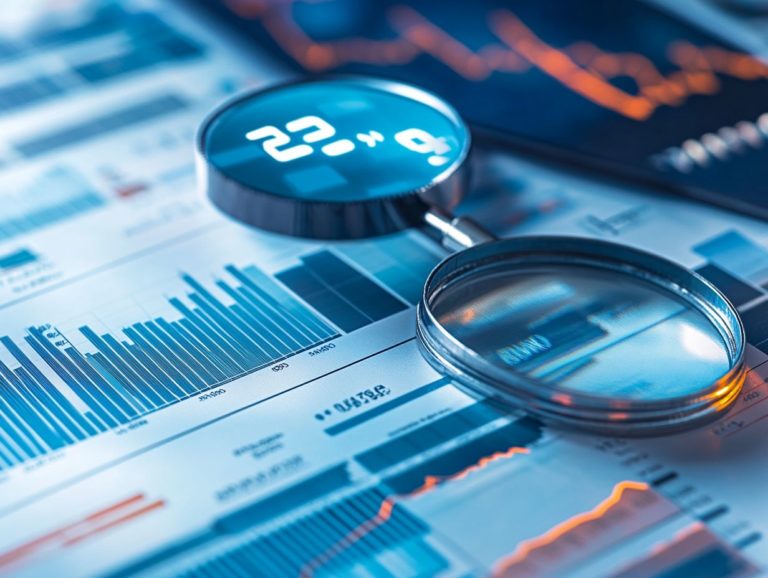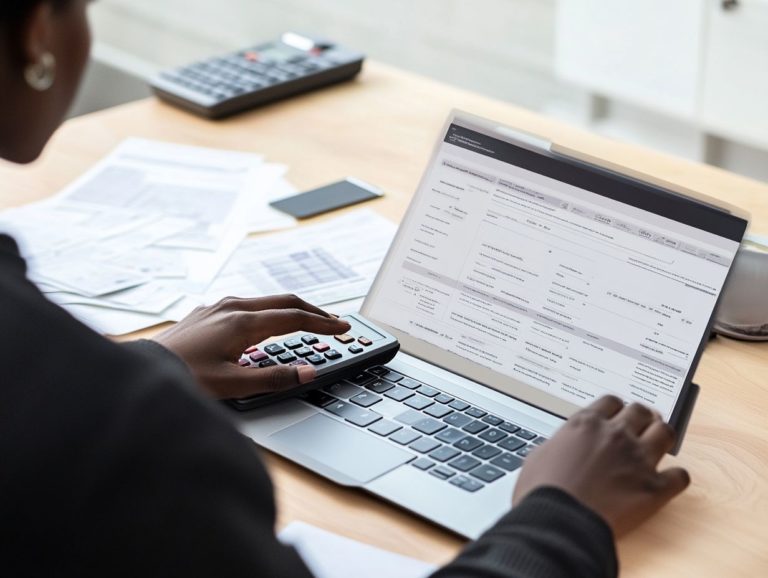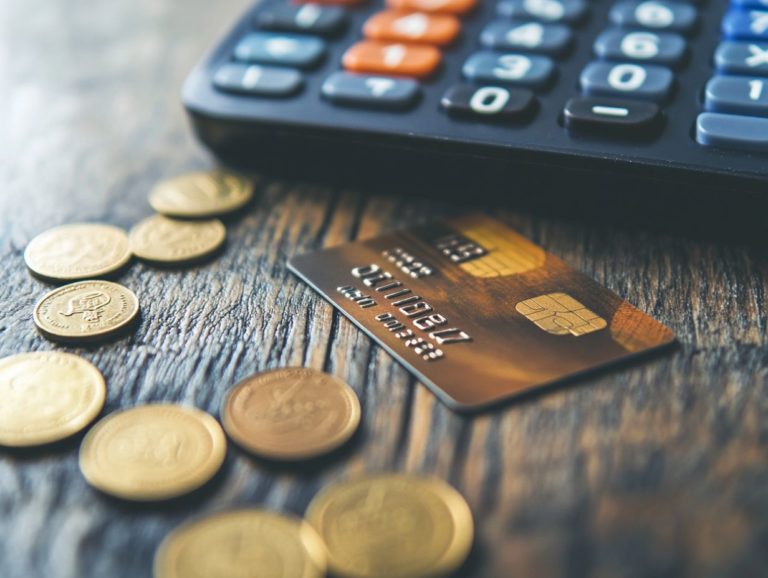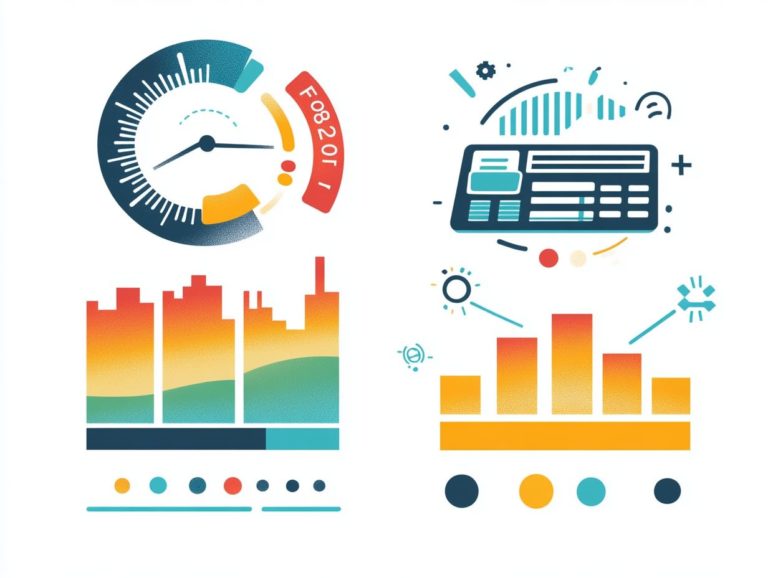The Impact of Bankruptcy on Your Credit Score
Bankruptcy can feel like a daunting financial decision, often clouded by misconceptions and fear. It’s essential for you to understand its definition and the various types available, especially if you re thinking about this path.
This article will delve into how bankruptcy impacts your credit score, uncovering the negative implications that come with it. Don t worry; there’s a way forward!
You ll discover effective steps to rebuild your credit after bankruptcy, as well as alternative debt relief options that might suit your needs. We ll also explore the legal and financial consequences you should know. So, dive in and arm yourself with the right knowledge that can guide you through this challenging journey!
Contents
- Key Takeaways:
- Understanding Bankruptcy
- How Bankruptcy Affects Your Credit Score
- Rebuilding Your Credit After Bankruptcy
- Alternative Options to Bankruptcy
- Legal and Financial Consequences of Bankruptcy
- Frequently Asked Questions
- What is bankruptcy and how does it affect my credit score?
- How long does a bankruptcy stay on my credit report?
- What are the different types of bankruptcies and how do they affect my credit score?
- How much will my credit score drop after filing for bankruptcy?
- Can I rebuild my credit after filing for bankruptcy?
- Are there any alternatives to filing for bankruptcy that will not impact my credit score as severely?
Key Takeaways:
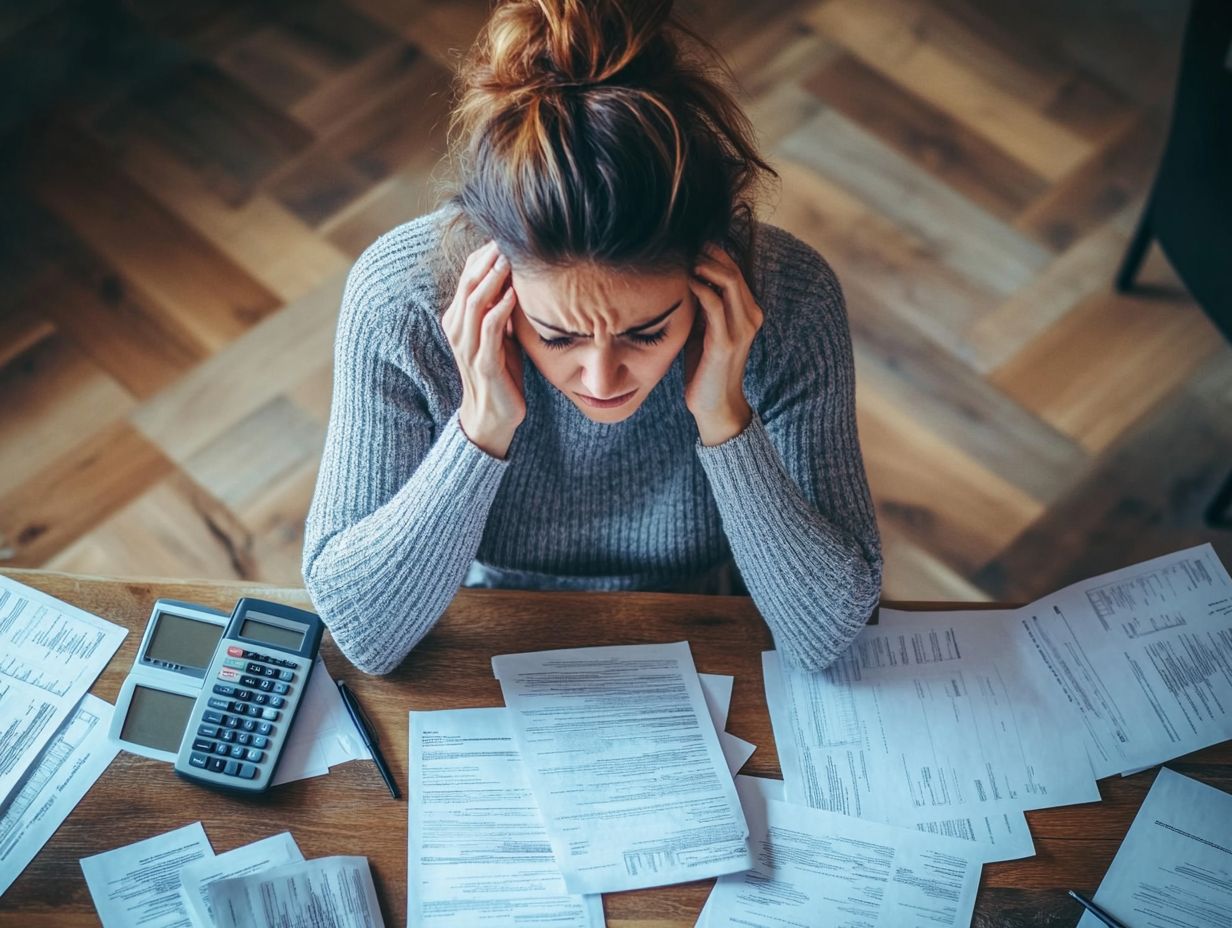
- Filing for bankruptcy can have a significant negative impact on your credit score, potentially lowering it by 200 points or more.
- After declaring bankruptcy, it is important to take steps to rebuild your credit, such as making timely payments and limiting new credit applications.
- Before considering bankruptcy, it is important to explore alternative options for debt relief, such as debt management plans or debt consolidation loans.
Understanding Bankruptcy
Understanding bankruptcy is essential for anyone grappling with financial difficulties, as it not only serves as a legal remedy but also significantly impacts your ability to borrow money and financial future.
Bankruptcy occurs when individuals or businesses find themselves unable to repay outstanding debts, prompting them to seek relief through legal channels. The two primary types of bankruptcy available to consumers are Chapter 7 and Chapter 13, each designed to address different financial circumstances and objectives.
Chapter 7, often known as selling off bankruptcy, allows for the discharge of most unsecured debts. Chapter 13 restructures debts through a repayment plan, enabling you to retain your assets. Grasping these options is crucial to making well-informed financial decisions.
Definition and Types
Bankruptcy is a legal pathway designed to provide relief for individuals or businesses that find themselves unable to meet their financial obligations. It primarily manifests in two forms: Chapter 7 and Chapter 13.
These two chapters serve distinct financial scenarios and objectives. Chapter 7 offers a fresh start by liquidating non-exempt assets to pay off creditors, allowing for a swift resolution. On the other hand, Chapter 13 introduces a repayment plan, enabling you to keep your assets while gradually addressing your debts over three to five years.
For creditors, understanding these distinctions is crucial, as they significantly affect their recovery prospects and shape their strategies in responding to people who owe money facing financial distress. Navigating the implications of each bankruptcy type on their financial interests is essential for making informed decisions.
How Bankruptcy Affects Your Credit Score
Bankruptcy exerts a significant and often detrimental influence on your credit score, a key factor in assessing your overall creditworthiness and your future ability to secure loans. Additionally, it’s important to understand the impact of divorce on your credit score, as this can also affect your financial standing.
When you file for bankruptcy, it marks a pivotal financial event on your credit report, resulting in a dramatic impact on your FICO score. Additionally, understanding the impact of identity theft on your credit score is crucial, as the effects can linger for years, complicating your chances of getting credit applications approved and limiting your access to favorable interest rates.
Understanding this impact is crucial if you’re thinking about bankruptcy as a solution to your financial challenges, as rebuilding your credit profile will require time and diligence. Act now to understand your options and protect your financial future!
Negative Impact on Credit Score
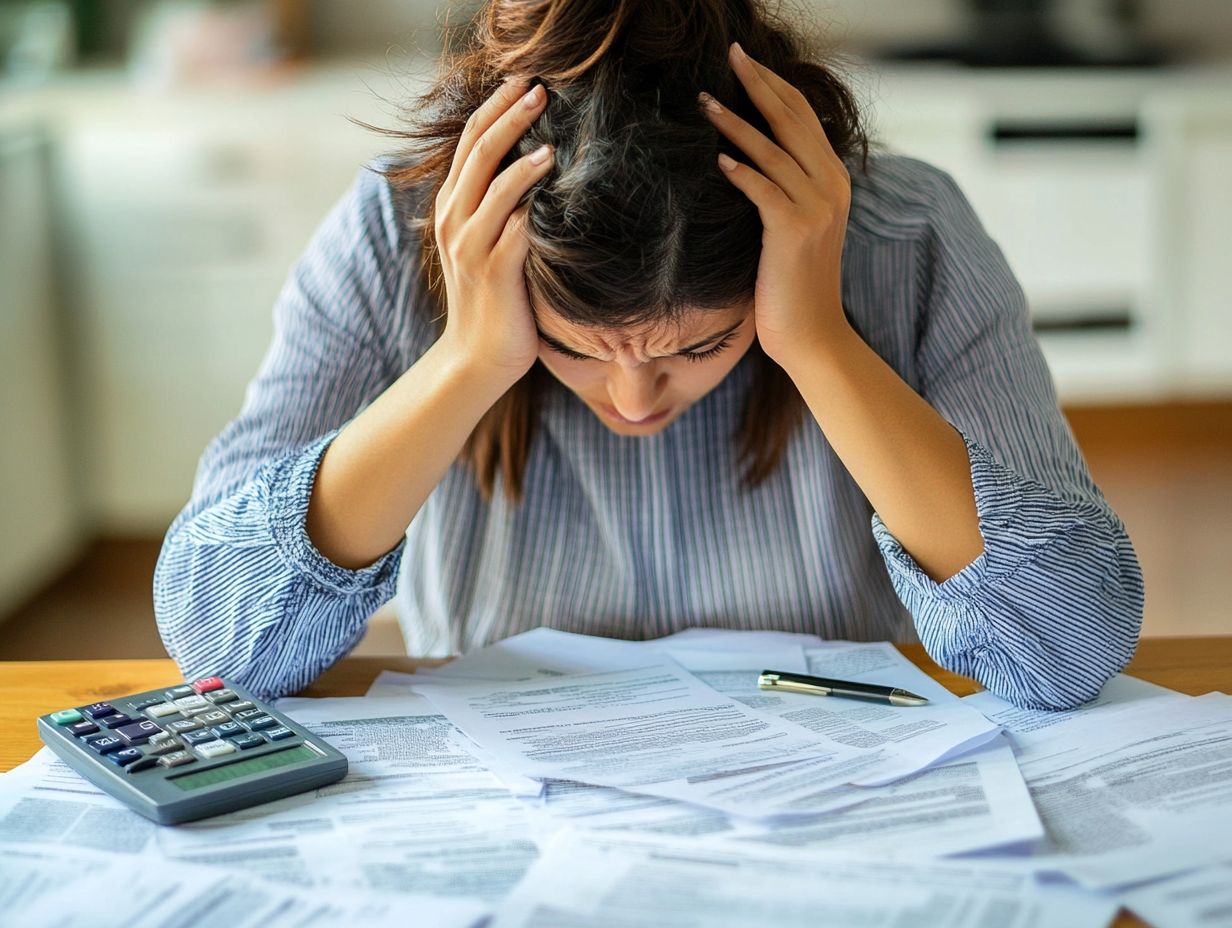
Bankruptcy can severely impact your credit score, often causing a drop of several hundred points. This decline can last for years. If you file for Chapter 7, that mark stays for up to ten years. For a deeper understanding of how credit decisions affect your score, consider exploring the impact of credit cards on your credit score, as Chapter 13 remains for seven years.
Chapter 7 offers immediate relief by discharging debts. However, it can hurt your FICO scores more due to total debt elimination. In contrast, Chapter 13 provides a repayment plan that helps lessen the damage over time.
Payment history is the most crucial factor in FICO scores. Thus, the challenges of bankruptcy can worsen your credit situation in the long run.
Rebuilding Your Credit After Bankruptcy
Rebuilding credit after bankruptcy is your first step toward financial stability. It involves strategies to boost your credit score and build a positive payment history.
You might feel overwhelmed after such a setback, but proactive measures can significantly improve your creditworthiness. One effective way is to use secured credit cards, which help rebuild credit through responsible use.
You can also seek credit counseling. This will provide you with a personalized plan for managing debt and improving your credit health.
Steps to Improve Credit Score
To improve your credit score after bankruptcy, follow strategic steps to establish a solid payment history. These actions are vital for restoring your financial health.
Consistently making timely payments shows potential lenders your reliability. Using secured credit cards is a smart way to start rebuilding a positive credit profile.
If you need guidance, credit counseling can help you manage debt and develop a plan for achieving a healthier credit score.
Alternative Options to Bankruptcy
Alternative options to bankruptcy offer realistic solutions for people facing money troubles. They empower you to regain control without harsh consequences.
Debt relief strategies like credit counseling and debt consolidation help manage debts effectively while protecting your credit score. These approaches often involve talking with lenders or setting up a structured repayment plan.
Exploring Other Debt Relief Options
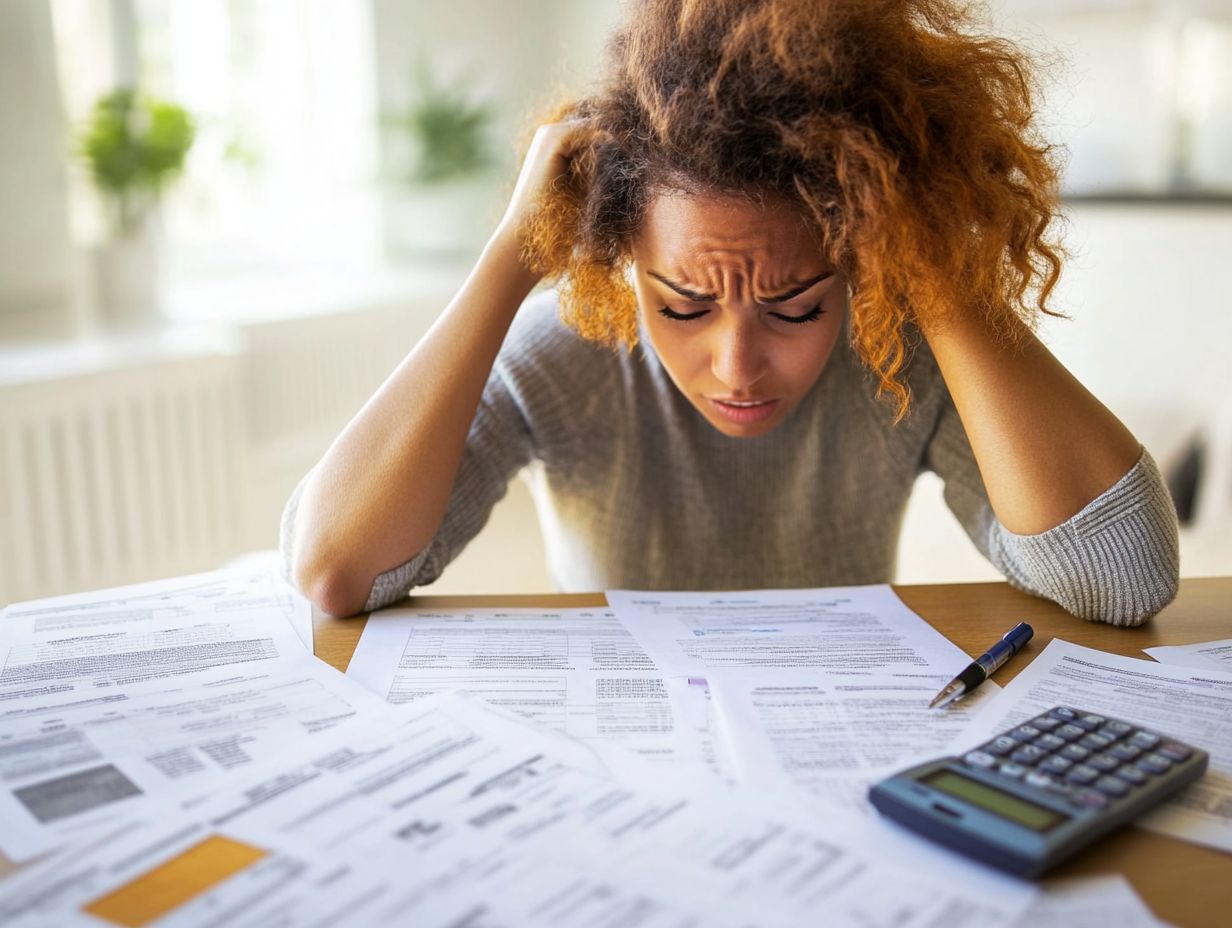
Exploring alternative debt relief options provides practical solutions to navigate financial hardships without bankruptcy. This can pave various paths toward recovery.
Credit counseling is among the most accessible options. Trained professionals offer personalized budgeting advice and negotiate lower interest rates with creditors for you. This clarifies your financial landscape and empowers you.
Debt consolidation lets you combine multiple debts into one manageable loan, often at a lower interest rate. This simplifies your payments and reduces the stress of missed deadlines.
By exploring these options, you can find hope and stability as you work toward a debt-free life.
Legal and Financial Consequences of Bankruptcy
The legal and financial ramifications of bankruptcy are substantial. They impact not just your financial standing but also your relationships with creditors and the broader legal context of your debts.
When you decide to file for bankruptcy, you enter into legal proceedings involving a bankruptcy trustee, a person assigned to manage your bankruptcy case. This trustee oversees your case and ensures that creditors are handled appropriately.
The implications vary based on the type of bankruptcy you choose, influencing your assets, debts, and future credit opportunities. Therefore, it s crucial for you to grasp the complete spectrum of these consequences.
Legal Proceedings and Financial Implications
The legal proceedings surrounding bankruptcy can be intricate. It’s crucial for you to understand your rights and obligations as a debtor, particularly regarding interactions with creditors and the trustee’s responsibilities.
Navigating these challenges often calls for the expertise of a skilled attorney who can clarify the complexities of the law for you. Be aware of how your financial situation affects your options and obligations, as these factors can profoundly impact both your future and that of your creditors.
The bankruptcy trustee plays a pivotal role in this process, overseeing the fair sharing of assets and ensuring adherence to legal standards. They serve as the bridge between you and your creditors. Understanding these dynamics is vital if you’re contemplating bankruptcy. The choices you make now can lead to significant, long-lasting financial consequences.
Frequently Asked Questions
What is bankruptcy and how does it affect my credit score?

Bankruptcy is a legal process where an individual or business declares that they are unable to pay off their debts. It is a last resort for those in serious financial trouble. Bankruptcy will significantly impact your credit score by causing it to drop drastically.
How long does a bankruptcy stay on my credit report?
A bankruptcy can stay on your credit report for up to 10 years. This can greatly affect your ability to get approved for loans, credit cards, or even housing. Understanding the long-term consequences is crucial before filing for bankruptcy.
What are the different types of bankruptcies and how do they affect my credit score?
There are two common types of bankruptcies: Chapter 7 and Chapter 13. Chapter 7 is a complete liquidation of assets to pay off debts, while Chapter 13 involves creating a repayment plan. Chapter 7 will impact your credit score more severely as it involves the discharge of debts, while Chapter 13 may have a less negative impact since it involves repayment.
How much will my credit score drop after filing for bankruptcy?
The exact amount your credit score will drop after filing for bankruptcy depends on your previous credit history and current credit score. However, it is common for a bankruptcy to cause a drop of 200 points or more, and it’s important to understand the impact of debt on credit scores.
Can I rebuild my credit after filing for bankruptcy?
Yes, it is possible to rebuild your credit after filing for bankruptcy. It will take time and effort, but by making timely payments, keeping balances low, and using credit responsibly, you can slowly improve your credit score. Don t wait start creating a better financial future now!
Are there any alternatives to filing for bankruptcy that will not impact my credit score as severely?
There are alternatives to bankruptcy, such as debt consolidation or credit counseling, that may not have as significant an impact on your credit score. Alternatives like debt consolidation can be less damaging to your credit score. Explore all your options with a financial advisor!

